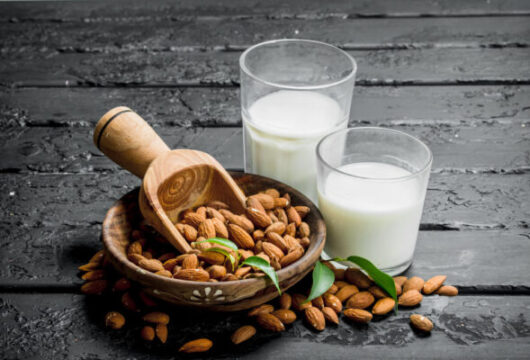The Healthy Debate: Almond Milk Vs. Dairy Milk
Introduction
In the ever-evolving world of dietary choices, one debate that has garnered significant attention is the comparison between almond milk and dairy milk. Both options offer distinct advantages and potential downsides, and choosing between them depends on various factors, including nutritional value, taste preferences, and dietary restrictions. This article aims to provide a comprehensive overview of the healthy debate surrounding almond milk and dairy milk, shedding light on the key differences, benefits, and concerns associated with each option.

Healthy Debate: Almond Milk Vs. Dairy Milk
When it comes to choosing a milk alternative, two prominent contenders often dominate the conversation: almond milk and dairy milk. These options cater to diverse dietary needs and lifestyle choices. Let’s delve into the specifics of each to help you make an informed decision.
Almond Milk: A Nutrient-Rich Alternative
Almond milk, derived from almonds, has surged in popularity as a dairy milk substitute. It boasts a naturally nutty flavor and is often enriched with vitamins and minerals, making it a desirable choice for those seeking a nutrient-rich beverage. Almond milk is also low in calories, making it a favorite among individuals aiming for weight management.
Although almond milk lacks the protein content found in dairy milk, it can be a suitable option for individuals following a plant-based diet or those with lactose intolerance. Moreover, it contains heart-healthy monounsaturated fats and may contribute to lowering cholesterol levels.

Dairy Milk: The Classic Choice
Dairy milk, a staple in many households, offers a rich source of essential nutrients, particularly calcium and vitamin D. These nutrients play a pivotal role in bone health and overall well-being. Additionally, dairy milk provides a substantial amount of protein, which aids in muscle maintenance and growth.
For individuals who aren’t lactose intolerant, dairy milk can be an excellent source of nutrients. It comes in various forms, including whole, skim, and reduced-fat options, catering to different dietary preferences.
Comparing Nutritional Value
| Nutrient | Almond Milk (1 cup) | Dairy Milk (1 cup) |
|---|---|---|
| Calories | 30-50 | 80-150 |
| Protein (g) | 1 | 8 |
| Calcium (mg) | 200-450 | 300-400 |
| Vitamin D (IU) | 100 | 100-130 |
| Fat (g) | 2.5-4.5 | 0.5-8 |
| Lactose | Absent | Present |
Taste and Texture Preferences
The taste and texture of almond milk and dairy milk significantly differ, and personal preferences play a pivotal role in selecting the right option. Almond milk boasts a distinct nutty flavor, which can add depth to smoothies and cereal. On the other hand, dairy milk provides a creamy and familiar taste, enhancing the experience of classics like chocolate chip cookies and macaroni and cheese.
Sustainability Considerations
Sustainability has become a crucial factor in dietary choices. Almond milk production requires significantly less water and generates fewer greenhouse gas emissions compared to dairy milk. Choosing almond milk may align with environmentally conscious values.
However, it’s essential to consider the impact of almond farming on bee populations, as these insects play a vital role in pollinating almond trees. Supporting sustainable and bee-friendly almond farming practices is crucial.
Dietary Restrictions and Allergies
Almond milk is a boon for those with lactose intolerance, dairy allergies, or individuals following a vegan diet. Its plant-based nature ensures it’s devoid of lactose and animal-derived ingredients. However, individuals with nut allergies should exercise caution and opt for other milk alternatives.
Dairy milk, while rich in nutrients, may not be suitable for individuals with lactose intolerance or milk allergies. Lactose-free dairy milk options are available and can be a suitable compromise for those who prefer the taste of dairy.
Frequently Asked Questions
- Is almond milk a good source of calcium? Almond milk is often fortified with calcium, making it a reasonable source. However, be sure to check the label for added calcium content.
- Does almond milk contain cholesterol? Almond milk is naturally cholesterol-free, making it a heart-healthy choice.
- Can I use almond milk in cooking and baking? Yes, almond milk can be used in various recipes, including cooking and baking. However, its nutty flavor might influence the taste of the final dish.
- Which milk is better for weight loss? Almond milk is lower in calories compared to dairy milk, making it a suitable choice for weight management.
- Can I get enough protein from almond milk? Almond milk has significantly less protein than dairy milk. If protein intake is a concern, consider other protein-rich sources in your diet.
- Is dairy milk the only source of vitamin D? While dairy milk is a source of vitamin D, you can also obtain this vitamin from sunlight exposure and dietary supplements.
Conclusion: Choosing What’s Best for You
In the healthy debate between almond milk and dairy milk, there’s no one-size-fits-all answer. Your choice depends on your nutritional needs, taste preferences, dietary restrictions, and ethical considerations. Almond milk offers a plant-based, nutrient-rich alternative, while dairy milk boasts a classic taste and essential nutrients.







